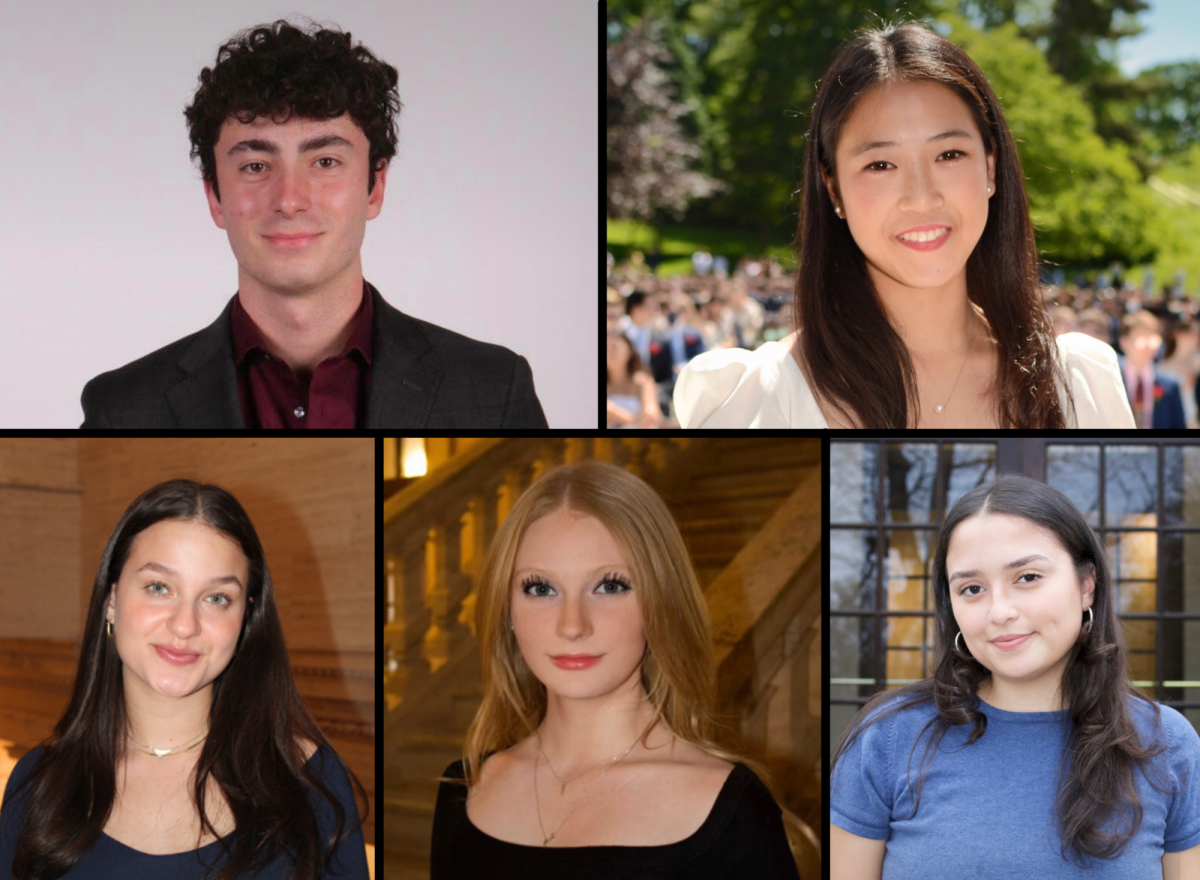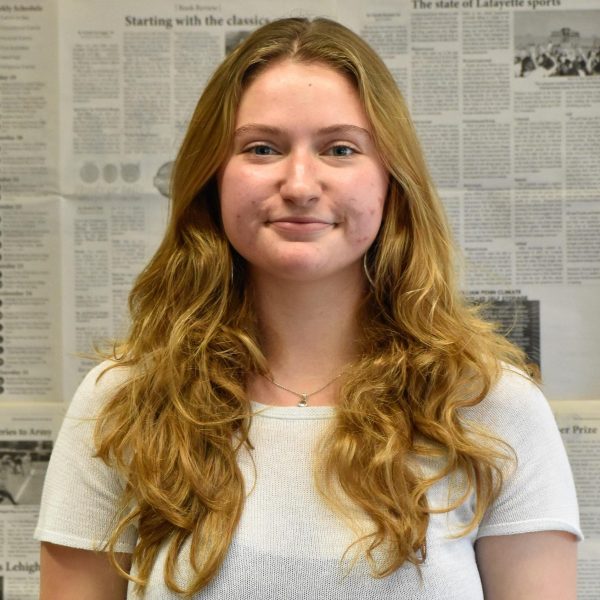Student Government election season has arrived, and with the candidates for vice president, communications officer and inclusivity officer running unopposed, the action is all in the presidential race.
There are no candidates for treasurer or parliamentarian, making this the second consecutive election cycle with no candidates for at least one office. Student Government itself must appoint a treasurer and a parliamentarian from its own until a special election is held. Only about 20 students with prior Student Government experience are eligible to run for treasurer.
This week, The Lafayette spoke with the candidates about their platforms. Ballots are available from Friday to Monday, according to Student Government. A candidate forum, hosted by The Lafayette, will be held Thursday at 7 p.m. in the Leopard Lair.
President
Rep. Alex Brown ‘26

Brown said he is running for president to achieve tangible results for the student body and to make Student Government more efficient and communicative.
In his platform, Brown wrote that he believes many students are not aware of Student Government activities and, “frankly, might not care.”
“If you don’t follow the Lafayette Student Government Instagram and you’re not getting an email blast, you have no clue that Student Government exists,” Brown said.
Should he be elected president, Brown said that he would communicate more with the student body through outreach events (Student Government already does this, occasionally), collaboration with The Lafayette, installing anonymous suggestion boxes and bolstering a committee he co-created in March to gather feedback from students.
“There’s a lot of ideas, and it’s gonna be a lot of trial and error,” Brown said. “But I think we should always be striving to make sure that we’re more effective than we were the day before.”
Brown said he would deliver concrete results that students can see, such as expanded composting in fraternity houses, improved parking ticketing practices that he said some call unfair and bringing new equipment to the Kirby Sports Center gym.
“I don’t know everything, I don’t have all the answers right now,” Brown said. “But addressing these specific issues that can produce tangible change for students and fix what’s affecting them is a big part of what I want to do.”
As president, Brown said he would work to make Student Government more efficient and more results-focused.
“People can meet for 20 hours with admin all they want, but if it doesn’t produce anything that students can see on a day-to-day basis that makes their lives better, then it doesn’t matter,” Brown said.

Vice President Yuko Tanaka ‘26
Tanaka said she is running for president to amplify the “presence of Student Government” and improve the organization’s external communications.
Tanaka said she believes Student Government voiced students’ opinions to the college administration during her 11-month-long vice presidency and that, if elected president, she would bring the administration to the students.
Students “have the right to know” what the administration is working on, she said.
Tanaka also said she has insight into the role of president, referencing her month spent fulfilling the role’s duties while current President Thania Hernandez ’25 took a leave of absence for personal reasons.
“I think it would definitely be an easy transition,” she said.
Tanaka said she would begin her term with an organization-wide training session to ensure that Student Government members have a “strong foundation” for the rest of the year.
“It would be really beneficial for members to have a really concrete idea of what Student Government does, what we’re here for and how we operate,” Tanaka said.
She said she believes such training would also improve member retention, which she is currently in charge of as vice president. Eleven Student Government members quit or were expelled over the past year, more than double the turnover rate of the prior administration.
“The vacancies that we have right now are sometimes, yes, inevitable,” Tanaka said. “But I feel like creating a strong foundation would definitely improve that aspect of Student Government.”
As vice president, Tanaka occasionally did not announce vacancies or publicize applications, and many of her campaign promises from last year remain unfulfilled. But Tanaka said her time in the position has helped her realign her goals.
“I think these are things that are very much doable,” Tanaka said of her current set of campaign proposals. “Having experience on exec board this past year has really helped me see what it’s like and see what’s feasible.”
Vice president
Inclusivity Officer Sasha Carter ‘27
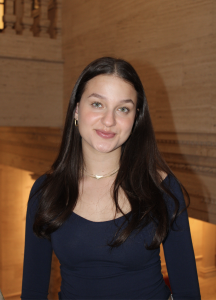
Carter is running for vice president uncontested on a platform of increased collaboration with the Office of Intercultural Development and improving Student Government’s internal culture. Carter declined to make promises she did not think she could keep.
“It’s great to go in with a plan, but I think it’s also a strength to be flexible and to adapt,” she said.
As the presumptive vice president-elect, Carter said she hopes to collaborate with organizations like the Office of Intercultural Development in multiple ways, such as by cosponsoring speaker events or alumni panels.
“I think that would be really beneficial to show Student Government support for different aspects of campus,” she said.
Carter was elected inclusivity officer in March as a self-proclaimed Student Government “outsider.” Although she has bolstered Pard Pantry as promised, Carter did not execute several other campaign platform points.
“I had some great ideas last year, but it was based on my perception of Student Government and what Student Government does and what it has the ability to do,” Carter said. “Now I feel like I have a more accurate sense of what’s realistic for me and what I hope to get done.”
Carter said she hopes to tackle Student Government’s high resignation rate by creating “team-strengthening events” and establishing monthly meetings for class year representatives.
“If they become close, there’s more of a sense of accountability to keep working,” Carter said of Student Government’s representatives.
Asked what she would do differently, Carter said Tanaka, the current vice president, “did a great job, but we can always do better.”
Carter said she’d build on the work of her predecessor while remaining accessible to her peers.
“I can’t stress this enough, a position higher up in the executive board doesn’t change who I am,” Carter said. “I am a hands-on person, no task is beneath me and I’m willing to chip in in any way, shape or form that I can.”
Communications officer
Parliamentarian Ava Gallia ’26
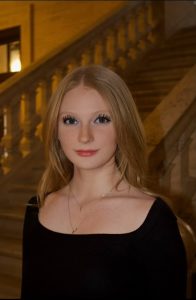
Gallia said she is running for communications officer to make Student Government “actively” communicate with the student body.
“I’d really like as communications officer to take a different approach,” she said. “I think it’s really important as an organization that we’re the ones taking initiative to reach out to students.”
Gallia said she believes Student Government currently practices a “passive model” of communication in which “students can reach out if they want to.”
She said that she hopes to pursue active communication by holding meet and greets, town halls and press conferences. She also said she would distribute a periodic Student Government newsletter or potentially invite students to join the Student Government WhatsApp group.
“A big model of communication we use right now is social media and I know that’s not necessarily applicable to everyone,” Gallia said, calling this a “limited scope.”
Last spring, Gallia ran for parliamentarian on a platform of increasing Student Government’s transparency and upholding the organization’s rules, both of which she often failed to do. On several occasions, she allowed Student Government to violate its own transparency measures.
“There’s so many things we could be doing to make sure that students better understand what Student Government does, especially why Student Government does the things that they do,” Gallia said. “I think that those are things that I can more effectively address as communications officer than I could as parliamentarian.”
Gallia said that under the current communications officer, Elle Lansing ‘26, Student Government has seen “successes and challenges.” Though Gallia said she believes Lansing “rallied people inside Student Government,” she acknowledged that Lansing did not always complete the position’s required tasks in a timely manner.
“A big reason why I’m running for communications officer is because of the challenges I faced as parliamentarian,” Gallia said. “A lot of them came from not-so-timely information dissemination.”
Inclusivity officer
Rep. Luna Garces ‘27
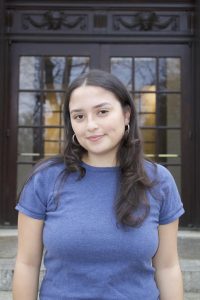
Garces said she is running for inclusivity officer to advocate for identity club budget increases and improve publicity for campus diversity initiatives.
“Those voices tend to be lost amongst the clubs that require thousands of dollars,” Garces said of identity-based organizations. “It’s becoming an unfortunate pattern.”
Student Government’s financial guidelines contain a nondiscrimination clause that states, “All financial decisions made by Student Government and its members shall be viewpoint neutral.”
According to Garces, who is running unopposed, many of her platform points are based on the results of a forum held by Student Government’s equity and inclusion committee in April. Garces said she hopes to hold similar forums monthly.
Garces also said she would aim to implement a weekly diversity, equity and inclusion office hour session, monthly newsletters containing “purely DEI events” and an anonymous bias incident report form. The latter is a project that the current inclusivity officer, Carter, proposed in March but never carried out.
Garces said the form would allow students to anonymously submit incidents of bias to Lafayette’s director of student advocacy and prevention and vice president for inclusion. The college’s One Pard form presently allows members of the campus community to anonymously report bias incidents to the chair of the bias support team, the director of educational equity and the dean of students.
“A One Pard is very important and helpful, but those tend to be about mental health and Title IX issues,” Garces said. “I think many students may not feel that like that is the best place for them.”
Garces said she would utilize Student Government’s equity and inclusion committee, which she currently serves on, to realize her goals.
“What I would want to do is kind of be the person that takes on the role of the bigger things,” Garces said. “But then trust that I can delegate out the smaller things to the DEI committee.”
As a POSSE scholar, Garces said she is in a unique position to make her “mark on this movement.”
“If there’s one thing I’ve been exposed to my entire life, it’s diversity,” Garces said.


























































































































